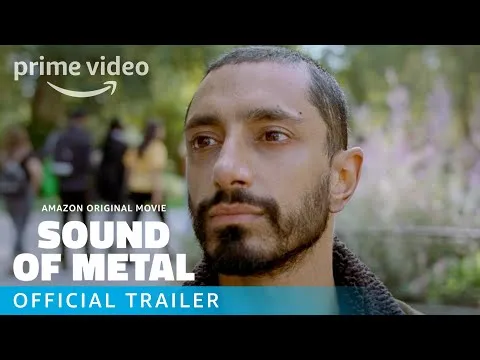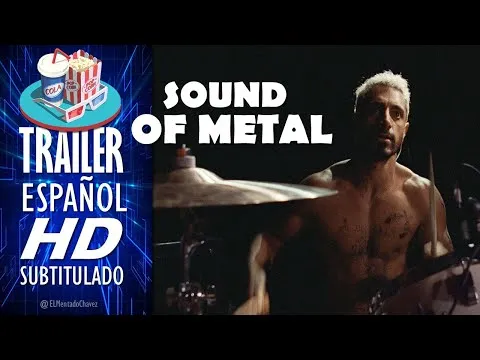SOUND OF METAL // El sonido del metal [ENG-ESP]
When I read what this film was about, I immediately wanted to see it. A musician who suddenly loses his hearing - how terrible! It seemed to me like a painter who loses his sight. And other examples that are not worth mentioning. The point is that the individual loses the ability or sense on which he depends mostly to develop his art, which sometimes is the same as his livelihood. How is he going to do? Without wishing to be pessimistic, this situation may be more real than we would like. In an era of pandemic many have lost their livelihoods, their jobs, their projects have been put on hold by something unforeseen and force majeure, and of which they have little control. I don't consider this film to be inspirational, to invite you to dream and fill you with a zest for life, but I think there are serious reasons to see this film differently.
Cuando leí de qué se trataba éste largometraje, enseguida quise verlo. Un músico que pierde súbitamente la audición. ¡Qué terrible! Se me pareció a un pintor que pierde la vista. Y otros ejemplos que no vale la pena mencionar. El asunto es que el que el individuo pierde la capacidad o sentido del que depende mayormente para desarrollar su arte, que a veces es lo mismo que su medio de vivir. ¿Cómo va a hacer? Sin querer ser pesimistas, ésta situación puede ser más real de lo que quisiéramos. En una era de pandemia muchos han perdido su medio de vida, sus trabajos, sus proyectos han quedado en pausa por algo imprevisto y de fuerza mayor, y del que se tiene poco dominio. Ésta película no considero que sea inspiradora, que te invite a soñar y llenarte de ganas de vivir, pero creo que tiene serias razones para ver ésta película diferente.
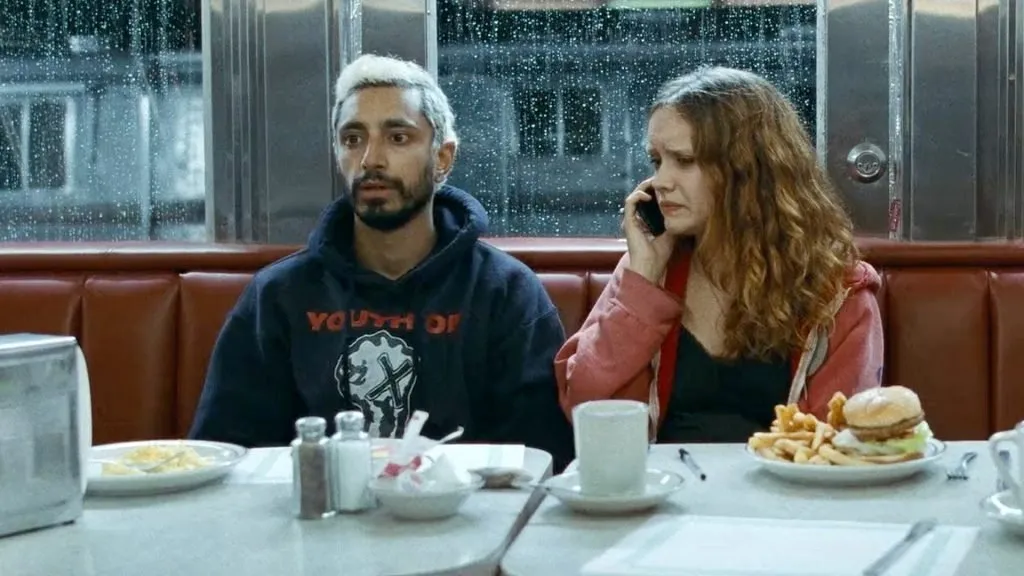
FUENTE: https://www.soylentidergi.com/sessizligin-gurultusu-sound-of-metal/
Although it may not seem appropriate to some, I have sometimes thought about this possibility of losing some sense or faculty. I remember once discussing this subject with a good friend of mine, who was well into his sixties. He confessed to me that he had once thought about how he would feel if he lost some sense. He thought of hearing. But I said, "If I had to choose to lose any of the senses, I think I would choose speech. No doubt about it. Then I'll say less nonsense and make fewer mistakes. And I'll still be able to listen to others, do a lot of things with my sight and hearing, and if I need to say something, I'll say it in signs or in writing. And that's it. And in fact, I still think the same way. Obviously I appreciate, care for and value all my senses, and I wouldn't want to lose any of them. But, well, it was just a guess. Some may just like to fantasize: "If I were invisible...", "If I could fly...". Cliché...
Well, the story centers on drummer Ruben (Riz Ahmed) who 10 minutes into the film suddenly loses almost all of his hearing. After the doctor assures him that the problem will continue to worsen, he reluctantly agrees to stay at a help center for the deaf with addictions run by Joe (Paul Raci). He must do so in the absence of his partner Lou (Olivia Cook) who is traveling to Paris to her father's house. Now Ruben must not only learn American Sign Language, but learn to be deaf. And here comes the most human and realistic part of such a situation. The internal struggles, the emotions and feelings involved, the place that personal goals will now occupy, the romantic relationship.... And finally, it will be a matter of making a decision.
Aunque a algunos no les parezca apropiado, a veces he pensado en ésta posibilidad de perder algún sentido o facultad. Recuerdo que una vez comentaba ese tema con un buen amigo, que ya pasaba los sesenta años de edad. Me confesó que alguna vez había pensado en cómo se sentiría si perdiera algún sentido. Él pensó en el oído. Pero yo le dije: "Si yo tuviera que elegir perder alguno de los sentidos, creo que elegiría el habla. Sin duda. Así digo menos disparates y me equivoco menos. Y podré seguir escuchando a los demás, desarrollar muchas actividades con mi vista y oído, y si necesito decir algo, lo digo en señas o escrito. Y ya". Y de hecho, sigo pensando igual. Obviamente agradezco, cuido y valoro todos mis sentidos, y no quisiera perder ninguno. Pero, bueno, fue solo unas suposiciones. A algunos quizás solo le guste fantasear con: "Si yo fuera invisible...", "Si yo pudiera volar...". Cliché...
Bueno, la historia se centra en el baterista Ruben (Riz Ahmed) quien a los 10 minutos de película pierde casi toda su audición de forma repentina. Luego de que el médico le asegura que el problema seguirá empeorando, acepta a regañadientes quedarse en un centro de ayuda para sordos con adicciones dirigido por Joe (Paul Raci). Debe hacerlo con la ausencia de su pareja Lou (Olivia Cook) quien viaja a París a casa de su padre. Ahora Ruben debe no solo aprender lenguaje de señas americano, sino aprender a ser sordo. Y ahí viene la parte más humana y realista de una situación como ésa. Las luchas internas, las emociones y sentimientos involucradas, el lugar que ahora ocuparán las metas personales, la relación sentimental... Y finalmente, será un asunto de tomar una decisión.
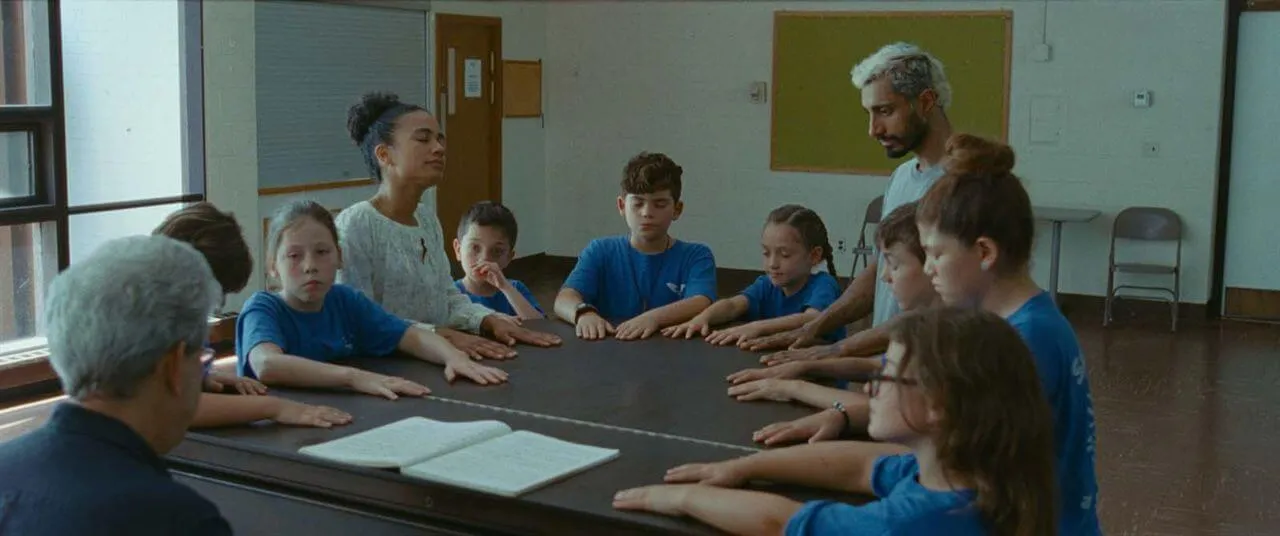
FUENTE: https://www.soylentidergi.com/sessizligin-gurultusu-sound-of-metal/
And here I find the first aspect why I liked this film. It shows very realistically one of the ways in which someone in similar circumstances could face this new complex reality. He could hardly prepare for this. The bewilderment is evident in Ruben's face as he plays the drums shortly after he loses his hearing, and the hours that follow. And even when the doctor is explaining to him the seriousness of the problem, he doesn't seem to understand what is involved. He's in something of a state of denial, because he's not interested in having me describe the impairment, but wants to know is what needs to be done for the solution. And even though this includes seeking a large sum of money, he is willing to put it together and remedy the situation. He tries not to let the problem hinder his work, and continues with the next pending gig, using his drumsticks, drums, cymbals (brass sound), but "dies trying".
I think it was wise to choose the actor, and that he was not well known. Riz Ahmed was able to convey with his eyes, with his look, what the character is feeling. In my case, it helps a lot to empathize with the fact that the actor is not so popular. For example, when you watch a Liam Neeson movie and something bad, and traumatic, happens to him, it's possible that at some point your inner voice says to you, "Relax, this guy is going to come out of it. He's done it before. He's Liam Neeson." Well, that's not happening in this case.
As I mentioned in my first introductory post, I was at an audio and video training for large meetings. In it, they emphasized the importance of taking care of the ear, and also educating it. Being in this area for those years made me aware of how important the ability to listen is for those who work with it. And I think that made me empathize more with Ruben, especially in the hearing test scenes. Unable to understand the word being said to him, he makes those slight head movements that indicate he realizes he's not getting the test right, which really isn't a minor problem. He even brings a hand to his face, so that in the end the doctor is left talking to himself, without any response from Ruben. Likewise, when he resigns himself to reading on a screen what Joe is telling him and asking him in the preliminary interview, before entering the institute. It must be terrible for any mortal to start turning to read on a screen to know what someone else is communicating, something that until recently one was able to perceive with one's ears naturally. These scenes were particular. There is no excess of emotions, no overacting. Probably many men could look like Ruben, having to start on the path of acceptance, adaptation, sadness and the search for the fuel to go on.
Y aquí encuentro el primer aspecto por el cual me gustó está película. Muestra con mucho realismo una de las formas en las que alguien en circunstancias parecidas podría afrontar ésta nueva realidad compleja. Difícilmente podría prepararse para esto. El desconcierto es manifiesto en el rostro de Ruben cuando toca la batería poco después que pierde la audición, y las horas siguientes. Y aún cuando el médico le está explicando la gravedad del problema, él parece no entender lo que está implicado. Está en algo así como un estado de negación, porque no está interesado en que le describa la deficiencia, sino que quiere saber es lo que hay que hacer para la solución. Y aunque ésta incluye buscar una alta suma de dinero, está dispuesto a juntarla y remediar la situación. Trata de que el problema no le entorpezca su trabajo, y continúa con el siguiente concierto pendiente, usando sus baquetas, batería, platillos (sonido del metal), pero "muere en el intento".
Creo que fue acertada la elección del actor, y que no fuera conocido. Riz Ahmed era capaz de transmitir con sus ojos, con su mirada, lo que está sintiendo el personaje. En mi caso, ayuda mucho a empatizar el hecho de que el actor no es tan popular. Por ejemplo, cuando ves una película de Liam Neeson y le pasa algo malo, y traumático, es posible que en algún momento te dice tu voz interna: "Tranquilo, éste tipo va a salir de eso. Así lo ha hecho antes. Es Liam Neeson". Bueno, eso no ocurre en éste caso.
Como les mencioné en mi primer post de introducción, estuve en una capacitación de audio y video para reuniones grandes. En ella nos recalcaban mucho la importancia de cuidar el oído, y también educarlo. Desenvolverme en ésta área por esos años me hizo consciente de lo importante que es la facultad de escuchar para los que trabajan con ello. Y creo que eso me hizo empatizar más con Ruben, en especial, en las escenas de la prueba de audición. Incapaz de poder entender la palabra que se le decía, hace esos leves movimientos de cabeza que indican que se da cuenta de que no está acertando en el test, que realmente no es un problema menor. Hasta se lleva una mano a la cara, para al final quedar el doctor hablando solo, sin respuesta alguna por parte de Ruben. De igual forma, cuando se resigna a leer en una pantalla lo que Joe le está diciendo y preguntando en la entrevista preliminar, antes de entrar al instituto. Para cualquier mortal debe ser terrible empezar a voltear a leer en una pantalla para saber lo que otro está comunicando, cosa que hasta hace poco uno mismo era capaz de percibir con los oídos de forma natural. Éstas escenas fueron particulares. No hay exceso de emociones, ni sobreactuaciones. Probablemente varios hombres podrían lucir como Ruben, al tener inicarse en el camino de la aceptación, la adaptacion, la tristeza y la busqueda del combustible para seguir adelante.
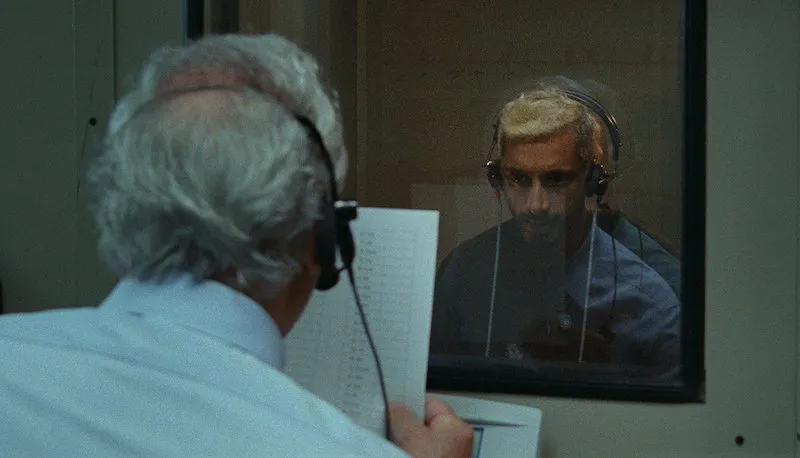
The subject of the partner is also addressed. Lou can tell that it really hurts him to see how the sudden change has affected Ruben. Still, it is clear to her that health comes first, rather than secular and material. She is very concerned that his distress will lead him to fall into addiction after four years clean. She wants to help him, but does not know how. So she goes to the doctor who treats Ruben, and she has no doubt that Joe's institute can also help him. But it hurts her to see that Ruben is reluctant and skeptical that it will really work. It's hard enough to accompany and help someone who is suffering emotionally, but that he doesn't see the help available as something that will work is even harder. And that is one of the realities that Lou's paper shows. She even tries to show Lou that what he does against himself would not only affect him. He doesn't seem to get it. And along comes something momentous: she decides to pull away from him, thus forcing him to be committed to Joe's high school. But the peculiar thing is that she would stay at her father's house, a relationship that is fractured. But she prefers that to continue accompanying Ruben in a situation that would achieve nothing but worsen his condition.
This certainly deserves a separate comment. Several have had to somehow force a sick person to accept the help that is offered, even though it is desired that it happen in a different way. That individual, who has undertaken a life to please the other, who is willing to set himself apart to promote his betterment, and now decides to go to a place where he knows he will have to deal with his own stale conflicts, is still sacrificing his own happiness for that of the other. That's Lou.
También se aborda el tema del compañero. A Lou se le puede notar que realmente le duele ver cómo ha afectado a Ruben el cambio repentino. Aún así, tiene claro que lo primero es la salud que lo seglar y material. Le preocupa sobremanera que la angustia de él lo lleve a caer en la adicción luego de 4 años limpio. Quiere ayudarlo, pero no sabe cómo. Por eso acude al médico que trata a Ruben, y no duda que el instituto de Joe también puede ayudarlo. Pero le duele ver que Ruben está reacio y escéptico de que de verdad funcione. Ya es difícil acompañar y ayudar a alguien que sufre emocionalmente, pero el que no vea las ayudas disponibles como algo que va a resultar lo es aún más. Y esa es una de las realidades que muestra el papel de Lou. Inclusive, trata de mostrarle a Lou que lo que él haga en su propia contra no solo le afectaría a él. Parece que él no lo entiende. Y llega algo trascendental: ella decide apartarse de él, y así obligarlo a que sea internado en el instituto de Joe. Pero lo peculiar es que ella se quedaría en casa de su padre, relación que está fracturada. Pero ella prefiere eso que seguir acompañando a Ruben en una situación que no lograría nada sino empeorar su condición.
Esto sin duda merece un comentario aparte. Varios han tenido que de cierta forma obligar a un enfermo a que acepte la ayuda que se le brinda, aunque se desea que ocurra de una forma diferente. Ese individuo, que ha emprendido una vida para complacer al otro, que está dispuesto a apartarse para promover su mejoría, y ahora decide ir a un lugar donde sabe que tendrá que lidiar con sus propios conflictos añejos, sigue sacrificando su propia felicidad por la del otro. Esa es Lou.
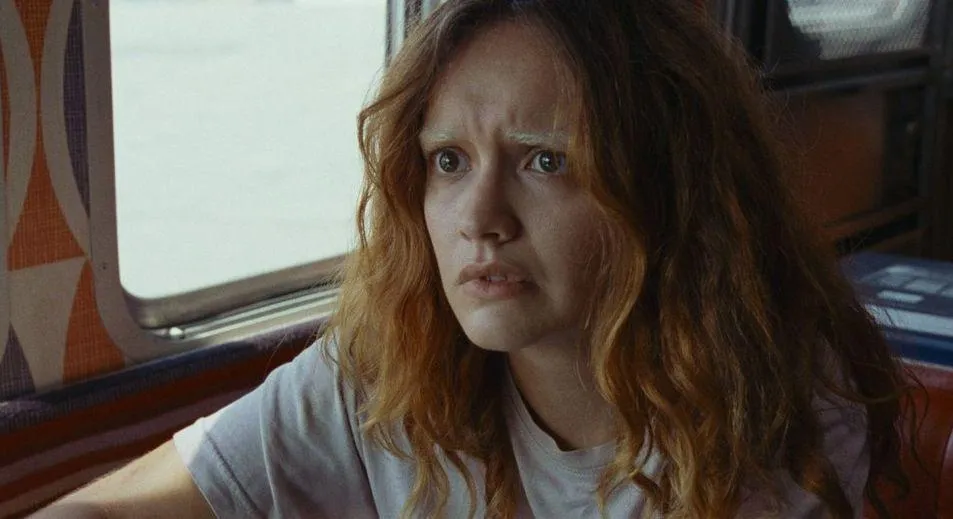
https://www.filmaffinity.com/es/filmimages.php?movie_id=806950
Talking about some technical aspects and decisions of the director (Darius Marder), it seems to me that they helped a lot to feel empathy for the protagonist. First, the way he presents the new way Ruben "listens". It is very reminiscent of when one has water in one's ears. Nothing intelligible. It was expected that he was only perceiving some frequencies. And he's generating it to you over the speakers in the room. Impressive. No wonder it won the Oscar in the last edition in this area. Also, the fact that it alternated quickly from loud and well-defined sound, to quiet and stillness. With this you get to appreciate what the musician is missing now. I also liked how it alternates equally between what Ruben is perceiving (with or without the clucking implant) and what we would normally perceive in a healthy way. For example, it shifts from an unusual and new communication for Ruben and one of the children when they are on a slide (sound of metal) Sound is key in this footage. And in my opinion they take the top note.
And what about Ruben when he is included with the other deaf people! They communicate, and try to communicate with him. But the fact that there are no subtitles yet of what they say puts you in Ruben's shoes. Uncertainty? Denial? Frustration? It depends on what you see in their eyes and how you feel. Just imagine what you would do in that situation. When you are resisting in accepting a fact, I think little things can be very difficult to do if they imply that you must do them as you are precisely in denial. For example, when Ruben tries unsuccessfully to tell the teacher and class of deaf children his name, he takes out his helplessness by writing it on the acrylic board in huge, aesthetically pleasing 0's. Just to write it is to admit that he is (and will be) deaf. Also, to see the level of learning at which you are placed in this method. Also, seeing a screen to read what someone else is saying. It may seem unimportant to those who watch or hear, but it is a real sacrifice for anyone in a similar condition.
Ya hablando sobre algunos aspectos técnicos y decisiones del director (Darius Marder), me parece que ayudaron mucho a sentir empatía por el protagonista. Primero, la forma en que presenta la nueva forma en que "escucha" Ruben. Recuerda muy bien cuando uno tiene agua en los oídos. Nada inteligible. Se esperaba que sólo estuviera percibiendo algunas frecuencias. Y te lo está generando por los altavoces de la sala. Impresionante. Con razón se ganó el Oscar en la última edición en ésta área. También, el que se alternara rápidamente del sonido alto y bien definido, a los silencios y la quietud. Con esto se logra valorar lo que se está perdiendo el músico ahora. También me gustó como alterna igualmente lo que está percibiendo Ruben (con o sin el implante cloquear) con lo que normalmente percibiríamos de forma sana. Por ejemplo, se pasa de una comunicación inusual y nueva para Ruben y uno de los niños cuando están en un tobogan (sonido del metal) El sonido es clave en esta filmación. Y a mi juicio se llevan la nota máxima.
¡Y qué decir de Ruben cuando es incluido con los otros sordos! Ellos se comunican, y tratan de hacerlo con él. Pero el hecho de que no hayan subtítulos aún de lo que ellos dicen te pone en los zapatos de Ruben. ¿Incertidumbre? ¿Negación? ¿Frustración? Depende de lo que veas en sus ojos y como te sientas. Sólo basta con imaginar qué uno haría en esa situación. Cuando se está resistiendo en aceptar un hecho, creo que las pequeñas cosas pueden resultar muy difíciles de realizar si estas implican que debes hacerlas como precisamente te niegas. Por ejemplo, cuando Ruben trata sin éxito de decirles su nombre a la maestra y clase de niños sordos, descarga su impotencia escribiéndolo en la pizarra acrílica con letras enormes y estética 0. Sólo escribirlo es admitir que es (y será) sordo. Además, ver el nivel de aprendizaje en el cual se te coloca en éste método. También, el hecho de ver una pantalla para leer lo que otro está diciendo. Pueden parecer sin importancia a los que observan o se enteren, pero es un real sacrificio para quien esté en una condición similar.
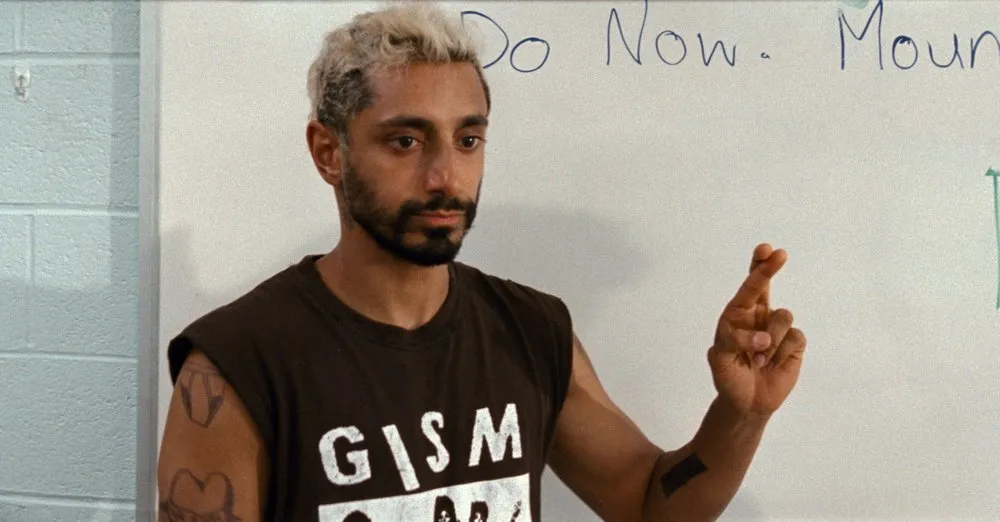
FUENTE: https://ortakoltuk.com/film-elestirileri/metalin-sesi-sound-of-metal-2
THE SCENE
I had a hard time choosing it. The scene at the audition where the realism hits hard, and the two peculiar farewells of Ruben and Lou are great. But I consider that the best one is the one that presents the conversation between Joe and Ruben when the latter comes back from surgery. A clear, direct and sincere dialogue. An impeccable Paul Raci, represents how Joe is hurt by the decision of the now very appreciated Ruben, who considers his condition as something to be repaired, in clear opposition to the fundamental idea of the school. In a good-natured way, Joe asks Ruben that he cannot remain on the premises, and that he must leave that very day. I chose it for all that is contained in its actions, intentions and goals, as well as for the effect they have on the other. No overacting. Lighting to match. Moving.
LA ESCENA
Me costó elegirla. La escena en la prueba de audición donde el realismo golpea fuertemente, y las dos despedidas peculiares de Ruben y Lou son buenísimas. Pero considero que la mejor es la que presenta la conversación que sostienen Joe y Ruben cuando éste último vuelve recién operado. Un dialogo claro, directo y sincero. Un Paul Raci impecable, representa como Joe está dolido por la decisión del ahora apreciadísimo Ruben, quien considera su condición como algo que debe reparar, en clara oposición a la idea fundamental de la escuela. De forma bondadosa, Joe le pide a Ruben que no puede permanecer en el lugar, y que debe marcharse ese mismo día. La elegí por todo lo que encierran sus acciones, intenciones y metas, además por el efecto que estos generan en el otro. Nada de sobreactuación. Iluminación acorde. Conmovedora.
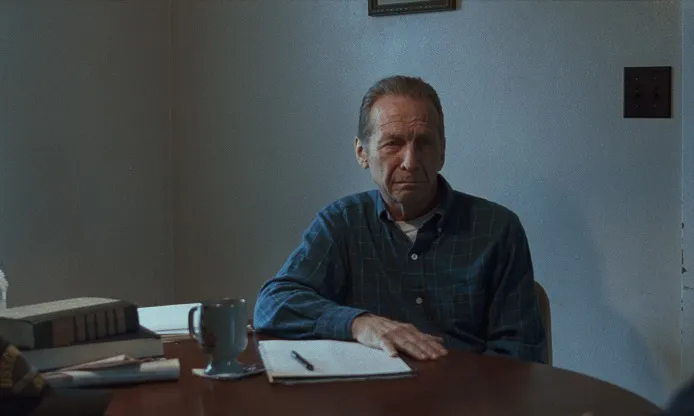
I liked the ending. Coherent and realistic. It has the necessary tone to understand that he reached his end. And the bell (sound of metal) helps us understand what the protagonist must be thinking and helps us speculate what will become of him from now on. And it is very much related to the peculiarity that Ruben had of sitting in a room, and only if he felt he could not be like that any longer, he should write, not draw, write, trying to make him feel comfortable with the silence.
As often happens, in the details are many things to enjoy: the scratching of Lou's arm, the music and food that the two musicians have must be very different from what many people imagine, the background of the actors, preparation for the roles. Homework for the house.
And we come to the part where I give my opinion: the top 3 phrases. They are here because they are well designed, that make you think, that you remember as time goes by, either because they are authentic, truthful, deep, original, controversial, vile lies or because they are key to understand the movie. Here they are... PUM!
El final me gustó. Coherente y realista. Tiene el tono necesario para entender que llegó a su final. Y la campana (sonido del metal) nos ayuda a entender lo que el protagonista debe estar pensando y nos ayuda especular lo que será de él en lo sucesivo. Y está muy relacionado con la peculiar que tenía Ruben de estar sentado en una habitación, y solo si sentía que no podía estar así por más tiempo, debía escribir, no dibujar, escribir, procurando que se sintiera cómodo con el silencio.
Como varias veces ocurre, en los detalles están muchas cosas para disfrutar: el rascarse el brazo de Lou, la música y alimentación que tienen los dos músicos debe ser muy diferentes a lo que varios imaginan, antecedentes de los actores, preparación para los papeles. Tarea para la casa.
Y llegamos a la parte donde doy mi opinión: el top 3 de frases. Están aquí por ser bien diseñadas, que te hacen pensar, que recuerdas al pasar el tiempo, bien sea por ser autenticas, veraces, profundas, originales, controversiales, viles mentiras o porque son clave para entender la película. Aquí están... ¡PUM!
"You don't need to fix anything here" (Joe)
"It's not that simple" (Doctor Paysinger)
"No scratches" (Ruben Stone)
"No necesitas arreglar nada aquí" (Joe)
"No es tan simple" (Doctor Paysinger)
"Sin rasguños" (Ruben Stone)
I recommend it. It will be like sitting and listening to someone who will tell you how life suddenly changed him. What he lost by walking the path of acceptance. What he gained when he made his own decision. A true story, as it often happens in life. Drawing lessons will be up to you.
La recomiendo. Será como sentarse a escuchar a alguien que te contará cómo la vida le cambio de repente. Lo que perdió transitando por el camino de la aceptación. Lo que ganó cuando tomó su propia decisión. Un relato real, como muchas veces sucede en la vida. Extraer lecciones dependerá de ti.
My social media / Mis redes sociales



